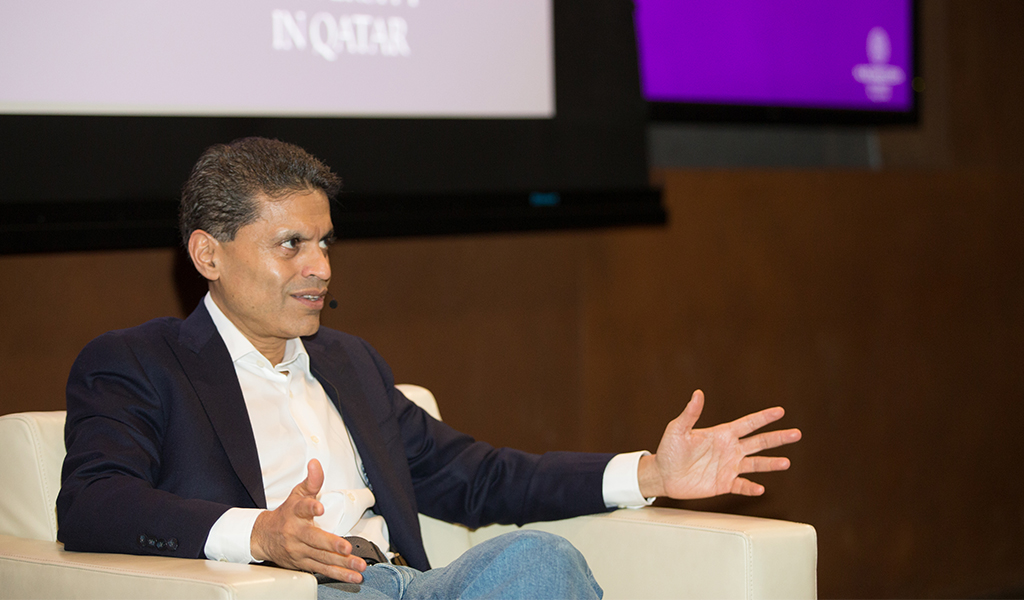The tremors of the growing era of ‘fake news’ felt across the globe were the focus of a special conversation at Northwestern University in Qatar (NU-Q) with internationally syndicated columnist and host of CNN’s GPS program, Fareed Zakaria.
Coinciding with his visit to Qatar as a keynote speaker for the annual WISE conference, Zakaria took part in a public interview before more than 100 students, faculty and staff on Tuesday. He discussed implications of a post-fact world, fake news, and the role of social media in shaping opinions and influencing news consumption among other topics in a session conducted by NU-Q Dean and CEO Everette E. Dennis.
In a wide ranging discussion that ranged from media coverage of foreign policy and domestic politics to the role writing and liberal arts education, the CNN commentator warned that globalization and digitization mandates new approaches, even radical ones for higher education.
During the session, Dennis asked Zakaria about the process of deciding what news to cover and how he is able to create content that appeals to a global audience. “We should choose a story,” Zakaria explained, “where we have something interesting or important to say, there needs to be an added value to everything you say, everyone you interview, and each topic you choose. It works best when there is a passion to what you are doing.” He added that post-hoc reviews of his weekly program are a essential element in its improvement. “We need to ask ourselves the tough questions if we are to make advancements,” he said, in arguing for more intellectual discipline for journalists.
On the ‘post-fact’ world, he was asked, “Is there is no more room for rigorous accuracy and fact-checking, or are we moving to a world of interpretation and analysis – which might not always be the same?”
“It’s a great dilemma,” Zakaria said. “There’s a great danger that we are entering a world enabled by all these technologies that we love … technologies that make no real distinction between truth and falsehood. In fact, it is easier for falsehood to go viral than a truth, because what virality is really dependent on is the sensational nature of the news. And, by definition, a lie is more sensational than the truth.”
He added, “the problem [of fake news] is now compounded by technology and compounded by the seemingly neutral nature of these platforms. I think we have a big task ahead of us – to find a hierarchy of knowledge. There has to be a way in which someone can distinguish between something that is actually factual and not.”
Also discussed was distinguishing between real and fake news and how the media are dealing with new challenges of attacks on their coverage and accusations of ‘fake news’ whenever the current U.S. administration disagrees with the content.
“The term ‘fake news’ was created to describe news that was intentionally created as false – to poison people’s understanding of a subject, to prejudice them in terms of voting, etc…” said Zakaria. “However, when President Trump refers to news he doesn’t like as ‘fake,’ it conflates the issue of falsehood, opinion, interpretation, etc., and that’s very damaging because it’s very hard to come back from. In the end, I have an enlightenment belief that truth will win.”
On social media and its increased use as a main source for news consumption, Zakaria underscored the importance of acquiring in-depth knowledge and not relying on fragmented bits of information to draw conclusions or believe as truth. “The challenge we all face is that it is easier to acquire superficial bits of information, and yet what makes you succeed in life is depth of knowledge,” he said, “We have created this mechanism of entertainment that allows you to very quickly graze and think that you know a lot, and actually that’s a very shallow understanding of what you actually need to know. There is no shortcut to actually acquiring mastery.”
In an open mike discussion with students, faculty and staff questions were raised about the issues related to news creation and consumption. NU-Q Professor Anto Mohsin asked about the importance of a liberal arts education for the students at NU-Q. In response, Zakaria said, “Liberal arts teaches students how to think and it teaches them how to write. These are two extremely important skills for personal and career development, and you would be surprised at how many people don’t know how to think logically – to build constructive arguments and influence people.”
Zakaria also responded to two journalism students who asked about challenges with censorship and covering challenging topics, “Be brave,” said Zakaria. “Pick your battles, be accurate, factual, and thorough with what you choose to cover – sometimes you need to push the envelope to make a change, and you might be pleasantly surprised but what you can achieve.”

